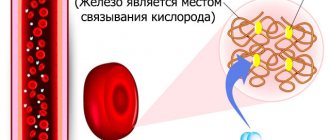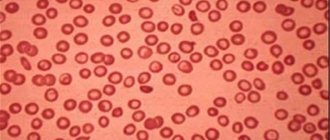Author of the article
Pastushok Vladimir Georgievich
Practicing nephrologist, experience over 11 years
Articles written
52
Contact the author
Urine with blood means that serious disruptions are occurring in the body. This phenomenon is medically called hematuria. This pathological process develops due to the influence of various factors. Regardless of the cause of the problem, hematuria requires urgent medical intervention. We will find out whether traces of blood in the urine always indicate danger and what are the sources of this process.
Does quantity matter?
There can be blood in the urine for various reasons. It should be noted that hematuria is not always detectable with the naked eye. In some cases, the disease is detected only through a series of tests.
Any amount of blood, even the smallest, indicates a malfunction in the body. Therefore, if such a symptom appears, you should immediately consult a doctor for a full examination. This especially applies to older people. In this case, the presence of red impurities during urination can lead to the development of serious diseases.
What are the causes of hematuria?
Today, there are more than a hundred reasons why blood comes out in the urine. Doctors say one of the most common is the penetration of blood from the genitourinary organs - the ureter, urethra, kidneys, bladder. Among others are considered:
- diseases of infectious origin;
- injuries;
- conglomerates (tumor-like formations);
- congenital kidney diseases;
- diseases in which blood clotting is impaired;
- regular use of medications that affect blood clotting;
- vascular diseases (renal vein thrombosis).
Blood in the urine of men and women can also mean the development of kidney disease.
- Pyelonephritis - usually this disease occurs without pain, only in rare cases the patient may complain of discomfort in the lower back and chills;
- Glomerulonephritis. In this case, blood is released in microscopic quantities. Glomerulonephritis can only be detected by laboratory tests. The disease is usually asymptomatic.
- Papillary necrosis. This disease is more typical for people suffering from diabetes.
Only a doctor can accurately answer the question of why blood may bleed when urinating and how to treat the pathology. Self-treatment in this case is unacceptable. Therefore, if blood is found in the urine, the causes of this condition should be determined immediately.
What to do
If there is bleeding from the bladder, treatment must be started. After diagnosis, a urologist or nephrologist treats the disease that caused the unwanted symptom. If a few drops of blood come out, the patient should be observed. The doctor prescribes medication and diet. In the absence of infectious diseases, ruptures of internal organs and malignant formations, you can get rid of blood clots during urination using traditional methods. In severe cases, surgery is performed.
Drug therapy
To stop bleeding from the urethra, you need to start taking medications. Depending on the disease, the doctor may prescribe:
- Infectious pathologies of the genitourinary system. In case of frequent urination with blood, antibacterial therapy is carried out - Monural, Nolitsin, Nitroxoline or Palin. Drugs with a diuretic effect are also prescribed - Furadonin, Cyston. During pregnancy, anticholinergic and painkillers are used. Canephron is taken when breastfeeding.
- Urolithiasis disease. In the presence of small blood clots, antibacterial agents, vitamins and diuretics are prescribed. If the patient has renal colic, antibiotics are excluded.
- Glomerulonephritis. If there is blood in the urine, antibiotic therapy is indicated - Ampicillin, Penicillin or Erythromycin. Drugs are prescribed to increase immunity, relieve inflammation, reduce swelling and reduce blood pressure.
- Injuries. If there are bloody drops and a minor bruise, it is necessary to take hemostatic drugs, antibiotics, painkillers and anti-inflammatory drugs.
- Endometriosis. The disease is treated with hormone therapy and painkillers. If there is bleeding from the bladder, non-steroidal anti-inflammatory drugs, electrical stimulation of nerve endings to relieve pain, and hemostatic agents are used.
- Oncology. With neoplasms, blood may bleed into the urine. Chemotherapy and radiation therapy are carried out. After the tumor shrinks, surgery is prescribed.
If blood is released after taking hormonal drugs or anticoagulants, you must stop taking them.
Diet and traditional methods
If drops of blood appear, you need to follow a diet. It is recommended to drink plenty of fluids, avoid alcoholic beverages, drugs, coffee and smoking. It is advisable to exclude sour, salty, fatty and fried foods. It is necessary to replace semi-finished and canned foods with foods rich in proteins and healthy fats. There are traditional methods that will help alleviate the course of certain diseases:
- Cystitis. A warm heating pad applied to the stomach helps. It is allowed to take warm baths without the use of sea salt and other cosmetics. The water should be warm, but not hot. It is useful to add decoctions of chamomile and other herbs to the bath. It is recommended to eat more berries, fruits and vegetables, including cranberries.
- Urolithiasis disease. An effective method is to drink water with honey on an empty stomach 15 minutes before breakfast. For 1 glass of water take 1 tsp. natural honey. Drink half a glass before each meal. If urate stones are present, dissolve 1 tsp in a glass of water. soda Drink 30 minutes before meals. Drinking alkaline water and freshly squeezed beet juice helps.
- Urethritis. It is recommended to drink decoctions of raspberries, lingonberry leaves, nettles, chamomile, and linden. The affected areas can be washed with a decoction of oak bark and chamomile. Herbs are taken in equal proportions and poured into 3 glasses of water. Take 1 glass per day in 3 doses.
- Glomerulonephritis. In case of illness, diet number 7 is prescribed. The consumption of protein foods, fatty meats and fish, and spices is limited. A decoction is used to treat the disease. Take corn silks and cherry tails and add 2 cups of water. You need to take half a glass up to 4 times a day. Make an infusion of black elderberry flowers. Pour water over the flowers and leave for 40 minutes. Take 1 glass per day.
- Endometriosis. Blood during urination can be eliminated by taking herbal infusions. In equal quantities you need to take hogweed and red brush. Pour 2 glasses of water and leave for 40 minutes. Take half a glass twice a day. Infusions containing elderberry, raspberry leaves, nettle, and celandine are effective.
Important information: How to treat profuse uterine bleeding and its symptoms
Traditional methods in the presence of blood in the urine should be combined with drug therapy. With an integrated approach, the condition quickly improves and negative symptoms disappear.
Operation
Surgery is required for urolithiasis. Abdominal surgery, laparoscopy or extracorporeal lithotripsy are performed. Endometriosis must be treated with medications, but if there is no result, laparoscopy is performed. If instead of urine there is a lot of bloody discharge due to a rupture of the pelvic organs after an injury, it is necessary to carry out suturing and drainage.
Traces of blood in the urine appear with neoplasms. Treatment is removal of the tumor and corrective therapy. At an early stage, radiation therapy followed by surgery helps. In severe cases, the bladder is removed and an artificial organ is formed.
Injury to the genitourinary system
Another common reason why bloody urine may be observed in men and women is a ruptured kidney or bladder. The patient experiences severe nausea and abdominal pain. Kidney injury is often accompanied by unbearable pain in the upper abdomen.
If the urethra is ruptured, then there is a feeling of distension in the lower abdominal cavity. Blood is released in large quantities when urinating.
Do you bleed after riding a horse? In this case, we can talk about injury to the urethral bulb.
Physiological factors
If the cause of blood getting into the urine is natural processes, men should not worry that this condition will take the form of a pathology. As a rule, such phenomena are temporary and do not require medical intervention. On the contrary, after minor correction they are easily eliminated.
Physical overload
The release of red blood cells into the urine may be due to harsh working conditions or excessive physical exertion. Intense sports training and lifting loads negatively affect the kidneys, namely the glomerular apparatus. As a result of microscopic damage to blood vessels, urine becomes stained, however, this condition is considered transient and does not threaten health. Only systemic loads that do not allow the body to recover in a timely manner are dangerous.
Sauna and overheating
A safe cause is considered to be overheating of the body, which occurs due to frequent visits to the sauna or bathhouse. High temperatures contribute to the dilation of blood vessels, increasing the permeability of their walls, and provoke minor bleeding into the urine. Similar manifestations occur in a patient with hyperthermia, fever due to colds. They are not accompanied by pain or cause discomfort, and immediately disappear as a result of eliminating the provoking factor.
After intercourse
The end of sexual contact or a series of several consecutive sexual acts in many men is characterized by the appearance of hematuria. Doctors say that this is due to damage to the capillaries, especially when they have increased permeability. As a rule, this phenomenon is considered temporary and does not cause discomfort. To strengthen the vascular wall, you should undergo a course of drug therapy prescribed by your doctor.
It is important to know! In rare cases, blood can be released in large quantities for a long period, as a result of which a man feels weak, dizzy, and nauseated. This condition requires a thorough examination of the kidneys and pelvic organs.
Other reasons
This category should include taking medications that affect the coagulation process - Heparin, Aspirin, Rifampicin, Cyclophosphamide. If blood is released in small quantities during urination, dosage adjustment of the drug or its discontinuation is not required. Otherwise, the doctor should change the medicine or reduce the dose.
Another reason is injury to the urethral mucosa due to improper installation of the catheter. Patients may notice blood in the body fluid for several hours or days.
Stones in the bladder and kidneys
The reason for the appearance of blood in the urine of men and women may be the presence of stones in the bladder and kidneys. At the initial stage of the disease, the patient does not even know about it, since there are no symptoms. Only large stones are a source of severe pain. In this case, the appearance of urine becomes bright scarlet in color, and sometimes streaks of blood stand out.
Normal composition of urine
Determining the composition of urine in men is currently not difficult. This can be done using its general clinical analysis. In the form received in hand, the patient can see a table indicating the main indicators and their values. Normally they look like this.
| Main settings | Values |
| Urine color | Straw yellow |
| Transparency | Transparent |
| Smell | Unsharp |
| pH reaction | 4-7 |
| Density | 1012-1022g/l |
| Protein | Not detected (up to 0.033g/l) |
| Glucose | Absent (up to 0.8 mmol)l) |
| Ketone bodies | No |
| Bilirubin | Not identified |
| Urobilinogen | 5-10 mg/l |
| Hemoglobin | absent |
| Red blood cells | Single in sight |
| Leukocytes | Up to 3 in p.z. |
| Epithelial cells | Up to 10 in p.z. |
| Cylinders | Absent (single hyaline) |
| Salts | Not identified |
| Bacteria | No |
| Mushrooms | None |
| Parasites | Not identified |
Cancer
With cancerous tumors, the patient produces blood clots when urinating. In this case, we can talk about a malignant process occurring in the bladder. With oncology developing in the kidneys, patients experience clots in the form of worms.
In urethral cancer, blood is detected during laboratory tests. The disease is treated surgically. The prognosis is positive in most cases.
In case of metastasis, radiation, chemotherapy, or complete removal of the bladder are performed.
It is worth saying that sometimes it happens that blood appears in stool and urine at the same time. This suggests that the patient has begun to metastasize the intestinal tumor, which has spread to the bladder. Feces with blood can occur in the case of dysbiosis, intestinal polyps, ulcerative colitis, intestinal infection, etc.
What does hematuria mean in women and children?
The most common reason why a woman may urinate blood is cystitis, an inflammation of the bladder. Cystitis with blood indicates the development of the disease in the acute stage. In this case, the woman experiences:
- regular urge to urinate;
- increased body temperature;
- pain in the lower abdomen;
- pain during and at the end of urination;
- discomfort during sexual intercourse.
Another source of bloody impurities in the urine is the inflammatory process that occurs on the lining of the urethra - urethritis. In addition, slight purulent discharge and severe pain at the end of urination are observed.
Other reasons are:
- endometriosis;
- nephritis;
- pyelonephritis;
- pyelitis;
- Bladder oncology.
Blood in the urine after exercise can also occur. In addition, physiological factors include:
- overheat;
- hypothermia;
- lifting weights;
- infections of bacterial and viral origin.
The causes of hematuria in children can be:
- urethral injury;
- kidney diseases;
- infectious diseases;
- improper care of the genitals;
- taking anti-inflammatory and antibiotic drugs;
- cystitis;
- hemorrhagic diathesis.
During pregnancy, spotting during and at the end of urination is also common. Many doctors are inclined to believe that the cause is an enlarging uterus, which compresses and injures the genitourinary organs. However, other more dangerous pathologies can also be sources. Therefore, it is better for the expectant mother to play it safe and tell the attending doctor about the problem.
Diagnosis and treatment
If blood appears in the urine or if the urine is uniformly colored red, be sure to pay attention to the shade of red. If the urine has a bright red or scarlet tint, then the blood in the urine is fresh, which means it appeared due to injury to the urinary tract. If the urine has a dark red color or even a brownish tint, then there is most likely a kidney pathology. In any case, the best solution would be to immediately contact a specialist - a urologist for advice. The urologist will conduct a questioning, collect an anamnesis of the disease and conduct an examination and physical examination, which includes identifying specific pathological symptoms characteristic of diseases of the urinary system. After this, he will refer you to special diagnostic procedures. Additional research methods include instrumental: ultrasound diagnostics of the pelvic organs, kidneys, as well as transrectal ultrasound diagnostics of the prostate gland. Also a prerequisite for diagnosis is the conduct of standard laboratory tests, such as: determination of a general blood and urine test and a biochemical blood test. This data will be sufficient to determine the exact cause of hematuria and prescribe targeted comprehensive treatment.
Treatment largely depends on the pathology that caused the hematuria. For inflammatory diseases, the main component of drug treatment is the prescription of antibacterial therapy with broad-spectrum antibiotics and anti-inflammatory symptomatic therapy. This course will help the body get rid of the infectious agent that caused the inflammatory reaction in the urinary system. If the cause of the disease is cancer, in particular prostate cancer, then the treatment will be completely different. An oncology patient is sent to an oncology hospital, where an oncologist determines the type and form of cancer, and then forms treatment tactics. When treating prostate cancer, a combination treatment is necessarily used, which includes surgical treatment through surgery, as a result of which the entire malignant tumor is removed along with the prostate gland, and then the second stage is either chemotherapy, consisting of several courses, or radiation therapy.
For hematuria associated with urolithiasis, drug therapy is carried out aimed at correcting metabolic processes, and the doctor also prescribes a special therapeutic diet that allows you to relieve the body’s urinary system. If large stones are detected in the kidneys, it is possible to carry out a procedure - contact lithotripsy; for this, a special ultrasound device is used that can crush urate stones. An obligatory component of therapy is the prescription of anti-inflammatory and antispasmodic drugs, which help combat hematuria more effectively. Traumatic kidney injuries do not require any specialized treatment. As mentioned above, hematuria associated with injuries goes away on its own within 14-20 days, however, to accelerate reparative processes in the kidneys, it is possible to use restorative measures and symptomatic therapy with the help of painkillers, anti-inflammatory and antispasmodic drugs.
General recommendations
Do not forget that one of the most important parts of treatment is the elimination of the factors that caused the disease and the appearance of blood in the urine. Only after eliminating such factors is it possible to effectively and quickly get rid of the disease. Also, eliminating risk factors will prevent the development of such diseases and relapses in the future, which is no less important. In addition to targeted or targeted therapy, a good addition would be the use of a course of physiotherapeutic procedures using electrophoresis in the lumbar region or UHF therapy. In addition to pathogenetic and symptomatic therapy, it is important to strengthen your own immune system; for this you simply need to lead a full and healthy lifestyle, have a balanced diet that contains a sufficient amount of vitamins, micro- and macroelements. Take good care of your body and be healthy!
Author : urologist Nikolai Dobroditsky
Publication date 03/25/2017
Red impurities in urine after surgery
Blood in urine after surgery is a normal phenomenon, which indicates the healing of tissues that are injured during surgery. In this case, hemorrhage will be observed for several days at the end of urination.
After operations to remove cancerous tumors, the passage of clots in the urine may continue for up to several weeks. If after the operation there was no blood in the urine, but a few days later the symptom appeared, this indicates a violation of the internal sutures.










